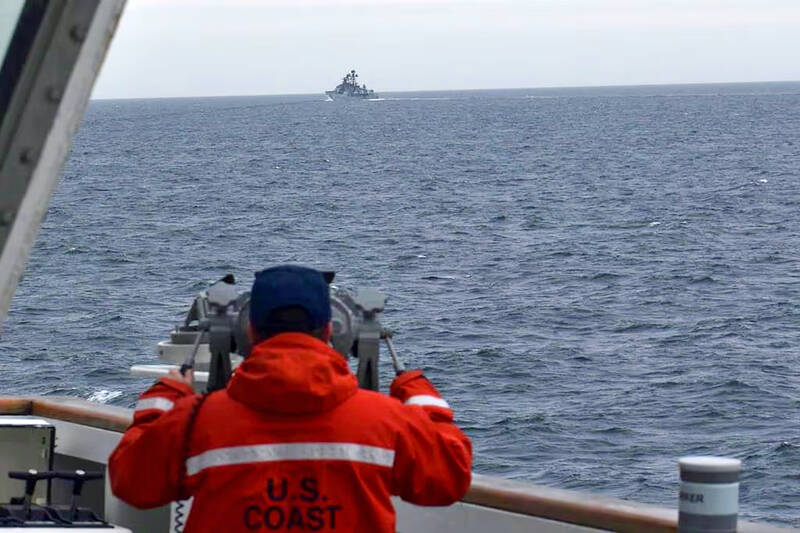A US Coast Guard cutter on routine patrol in the Bering Sea came across several Chinese military ships in international waters but within the US exclusive economic zone, officials said.
The crew detected three vessels about 200km north of the Amchitka Pass in the Aleutian Islands, the US Coast Guard said in a statement on Wednesday. A short time later, a helicopter aircrew from US Coast Guard Air Station Kodiak spotted a fourth ship about 135km north of the Amukta Pass.
All four of the Chinese People’s Liberation Army (PLA) vessels were “transiting in international waters but still inside the US Exclusive Economic Zone [EEZ],” which extends 370km from the US shoreline, the statement said. The PLA vessels told the coast guard their purpose for being there was “freedom of navigation operations.”

Photo: U.S. Coast Guard District 17 via AP
“The Chinese naval presence operated in accordance with international rules and norms,” Seventeenth Coast Guard District Commander Rear Admiral Megan Dean said. “We met presence with presence to ensure there were no disruptions to US interests in the maritime environment around Alaska.”
US Coast Guard Cutter Kimball is a 127m ship based in Honolulu. The US Coast Guard said there is no requirement for foreign nations to proactively contact a country before entering their EEZ and in this case said the Chinese vessels responded when the coast guard reached out on radio.
The US Coast Guard did not say how long the Chinese ships were in the EEZ, but said the Kimball and an aircrew monitored them until they transited south of the Aleutian Islands and into the North Pacific Ocean.
The sighting of the ships came a week after the PLA Navy began its annual joint patrol with the Russian Navy in the Pacific Ocean, the US Naval Institute reported on Friday last week. It said the patrol is scaled down from previous years, including August last year when more than 10 ships from China and Russia formed a flotilla off Alaska.
In September 2022, the Kimball spotted several ships from China and Russia in the Bering Sea, and in September 2021, US Coast Guard cutters in the Bering Sea and North Pacific Ocean encountered Chinese ships about 80km off the Aleutian Islands. The US Coast Guard said there was a similar incident last year that the Navy responded to.
“Our military needs to be ready for increasing Chinese, and joint Chinese and Russian military activity near Alaska’s coast,” US Senator Dan Sullivan said in a statement after being briefed on the Chinese presence.
“I also met yesterday morning with the chairman of the Joint Chiefs of Staff and specifically raised this issue — how America must be much more prepared for the increasing activity in the Arctic, and to also let Alaskans know that our military is on the job protecting our state and our country,” Sullivan said.
The US military routinely conducts what it calls freedom of navigation operations in disputed waters in Asia that China claims as its own, deploying Navy ships to sail through waterways such as the South China Sea. The US says freedom of navigation in the waters is in the US’ national interest.
When the Chinese vessels describe what they’re doing as “freedom of navigation operations,” it’s essentially China flexing its muscles by showing up in a part of the world that the US considers part of its sphere of influence, said Aaron Davenport, a retired senior coast guard officer and senior policy researcher at the RAND Corp.
He said it’s similar to how the US has deployed coast guard or other ships to the Taiwan Strait to uphold freedom of navigation and support US’ allies in the region — with the important distinction that the Aleutian Islands are clearly part of the US.

Ten cheetah cubs held in captivity since birth and destined for international wildlife trade markets have been rescued in Somaliland, a breakaway region of Somalia. They were all in stable condition despite all of them having been undernourished and limping due to being tied in captivity for months, said Laurie Marker, founder of the Cheetah Conservation Fund, which is caring for the cubs. One eight-month-old cub was unable to walk after been tied up for six months, while a five-month-old was “very malnourished [a bag of bones], with sores all over her body and full of botfly maggots which are under the

BRUSHED OFF: An ambassador to Australia previously said that Beijing does not see a reason to apologize for its naval exercises and military maneuvers in international areas China set off alarm bells in New Zealand when it dispatched powerful warships on unprecedented missions in the South Pacific without explanation, military documents showed. Beijing has spent years expanding its reach in the southern Pacific Ocean, courting island nations with new hospitals, freshly paved roads and generous offers of climate aid. However, these diplomatic efforts have increasingly been accompanied by more overt displays of military power. Three Chinese warships sailed the Tasman Sea between Australia and New Zealand in February, the first time such a task group had been sighted in those waters. “We have never seen vessels with this capability

A Japanese city would urge all smartphone users to limit screen time to two hours a day outside work or school under a proposed ordinance that includes no penalties. The limit — which would be recommended for all residents in Toyoake City — would not be binding and there would be no penalties incurred for higher usage, the draft ordinance showed. The proposal aims “to prevent excessive use of devices causing physical and mental health issues... including sleep problems,” Mayor Masafumi Koki said yesterday. The draft urges elementary-school students to avoid smartphones after 9pm, and junior-high students and older are advised not

Chinese President Xi Jinping (習近平) attended a grand ceremony in Lhasa yesterday during a rare visit to Tibet, where he urged “ethnic unity and religious harmony” in a region where China is accused of human rights abuses. The vast high-altitude area on the country’s western edge, established as an autonomous region in 1965 — six years after the 14th Dalai Lama fled into exile — was once a hotbed for protest against Chinese Communist Party rule. Rights groups accuse Beijing’s leaders of suppressing Tibetan culture and imposing massive surveillance, although authorities claim their policies have fostered stability and rapid economic development in